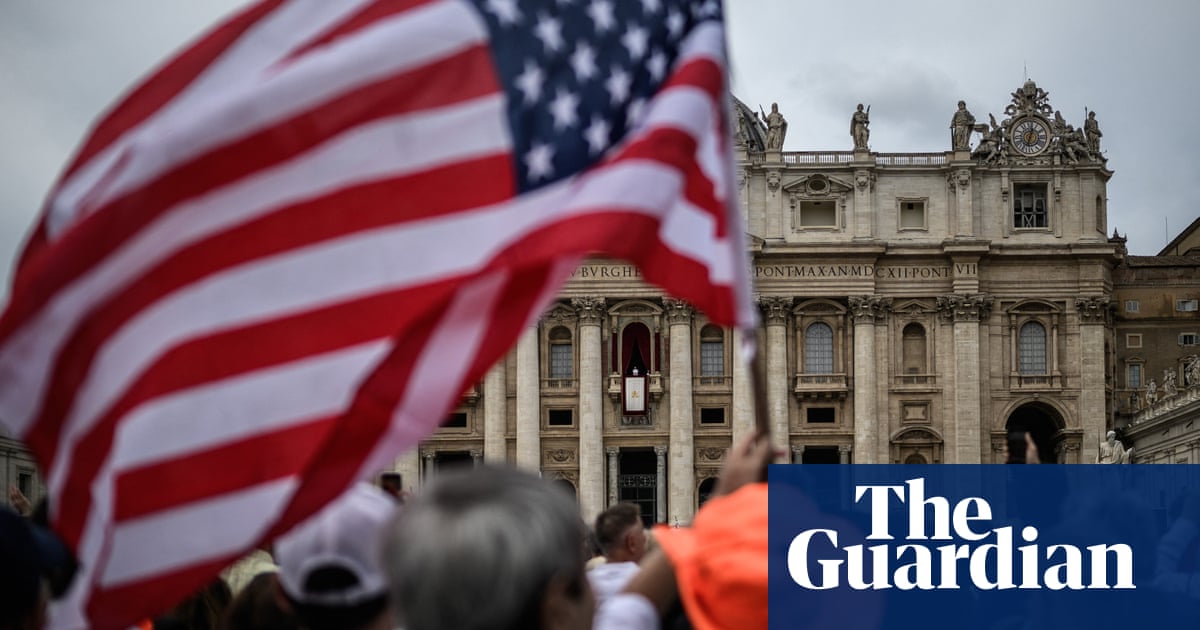Even before the chimney on top of the Sistine Chapel emitted its last puff of white smoke, signalling to the world that the Roman Catholic church had a new pope, Atlante Star, a hotel with a privileged view over St Peter’s Basilica from its rooftop terrace, began to receive inquiries about room availability over the following few days.
Then, about an hour later, whenthe Chicago-born cardinal Robert Prevost was declared Pope Leo XIV, the inquiries turned into bookings as the tourists, mostly from the US, rushed to secure a place to stay in Rome in time for the pontiff’s inaugural Sunday mass on 18 May.
“Some made tentative bookings but when the date was announced things really started to move,” said Federico Mencucci, the hotel’s owner. “We are now mostly full with people from North America, and not just pilgrims.”
US visitors, appreciated for traditionally being generous spenders and tippers, already make up the largest cohort of tourists in the Italian capital, with a record 2.5 million visiting in 2024.
Now the city is counting on being blessed with even more, driven by what the Italian newspapers are calling the “effetto Papa Leone XIV” – thePope Leo XIVeffect.
Gelato makers are conjuring up “Papa Leone” flavours to appeal to US tastes, while a bar in the vicinity of the Vatican is hoping to attract new custom by promoting a beer named after the new pope.
Initial signs look promising: during conclave, when images of Rome and the Sistine Chapel, where the secret papal election was held, were broadcast across the world, Booking.com registered a 36% rise in searches for Rome among US-based users of the site.
Official data on actual bookings since Prevost, the first US pope in Catholic church history, was elected, is not yet available.
But if papal history dictates travel trends, Rome can expect a boom in American arrivals, just as the papacy of the popular Pope Francis saw a rise in Argentinian visitors and John Paul II’s brought an increase in visits by Poles.
“The choice of an American pope, the first in history, will certainly influence US tourist flows,” said Alessandro Onorato, Rome’s tourism councillor. “They are already our primary market.”
The entire tourism chain in Rome and beyond is certainly hoping the trend will continue, especially after a relatively slow start to the much-anticipated Catholic jubilee year (a special year of forgiveness and reconciliation, held every quarter century).
“Our expectations were low when Pope Francis became ill and spent two months in hospital,” said Mencucci.
“Any jubilee events that did take place were missing the main actor. But after his death and the conclave, it certainly feels as if this new pope has reawakened things.”
Gianluca De Gaetano, manager of the Rome unit for Federalberghi, the hotels’ association, is also cautiously optimistic.
“At the moment, the hotel occupancy rate is similar to this time last year,” he said. “While on one hand, the jubilee attracted a few more tourists, others were discouraged due to worries about overcrowding.
“Let’s say that the death of Francis and the election of a new pope has helped rebalance a situation that was a little negative during the first few months of the year.”
De Gaetano said that while the hotel sector is “indifferent” to a pope’s nationality, having more higher-spending tourists from the US was not to be sniffed at because it feeds the entire city.
A survey in February by the European Travel Commission found that 33% of US tourists inEuropespend more than €200 (£170) a day.
Cinzia Renzi, president of Assoviaggi-Confesercenti, an association of travel agencies for Rome and Lazio, predicts the impact of Pope Leo on travellers from the US, home to the world’s fourth largest Catholic population, will be felt more over the next year or two.
“American dioceses are very well organised and will certainly take the opportunity to plan trips that are not already scheduled,” she said.
Massimiliano Del Monte, owner of Gelateria Del Monte in Borgo Pio, just steps away from the Vatican, is not leaving anything to chance. He is one of two ice-cream makers in Rome known to be preparing a special flavour to lure US custom.
“Over the years Americans have always asked for a flavour with peanuts, so I have taken this cue to create something new,” he said.
The ice-cream, called Leonem, needs a little perfection and will be ready to serve on Monday, the Guardian was told. Still, Del Monte has already noted a flurry of US custom since Leo was elected.
“Beyond my ice-cream, the real reason more Americans are attracted to Rome is because of Pope Leo, and I think this is a true blessing, and not only for Italy’s tourism – he has arrived at a delicate moment in the world, when we need peace.”
Danielle, a non-Catholic, and Daryl, a lapsed one, from Cincinnati in Ohio, agreed.
They were in Sorrento when the white smoke appeared. “The reaction was mind-blowing,” said Danielle. “But we didn’t know the new pope was American until a friend called us from home.”
The couple then travelled to Rome, where they are staying in a hotel in Esquilino booked a year ago. It was only when they arrived that they realised Pope Francis had been buried in the nearby Santa Maria Maggiore Basilica.
“The first thing we did was visit his tomb,” said Danielle as the couple ate dinner in a restaurant opposite the basilica. “From the first impression, Leo seems like he’ll be a good pope. We certainly need goodness right now.”
